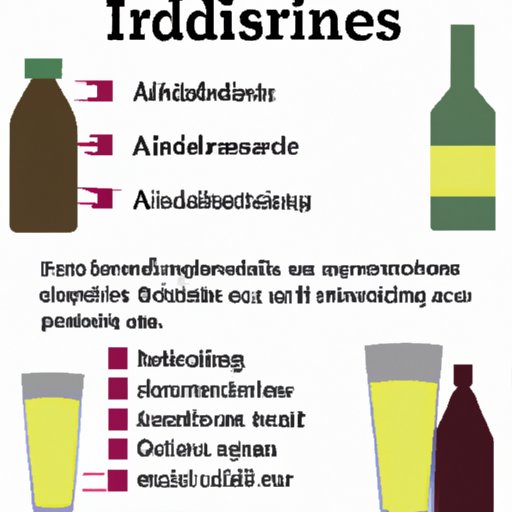
I. Introduction
Antidepressants are commonly prescribed medications used to treat symptoms of depression and anxiety. They work by regulating neurotransmitters in the brain. Alcohol, on the other hand, is a depressant that affects the central nervous system. Both antidepressants and alcohol can alter your mood and behavior, making it important to understand how they interact when used together.
In this article, we will explore how much alcohol you can drink while on antidepressants, the potential risks and benefits, and safe drinking guidelines to help you make informed decisions about your mental health and well-being.
II. A Comprehensive Guide to Antidepressant-Alcohol Interactions: How Much is Too Much?
Antidepressants come in various forms, including selective serotonin reuptake inhibitors (SSRIs), serotonin-norepinephrine reuptake inhibitors (SNRIs), tricyclic antidepressants (TCAs), and monoamine oxidase inhibitors (MAOIs).
When it comes to alcohol, all antidepressants have the potential to interact with the substance in different ways. For example, alcohol can increase the sedative effects of antidepressants, leading to extreme drowsiness or dizziness. Consuming alcohol while on antidepressants can also worsen depressive symptoms, decrease the effectiveness of the medication, and increase the risk of overdose.
Other factors that can affect the interaction between alcohol and antidepressants include the type and dosage of medication, a person’s weight, age, and gender, and the frequency and amount of alcohol consumption. Generally, the more alcohol consumed, the greater the risk of interaction with medication.
The level of risk involved varies depending on the individual and the medication they are taking. However, as a general rule, it is recommended that people avoid drinking alcohol while taking antidepressants.
III. The Effects of Drinking Alcohol While Taking Antidepressants: What You Need to Know
The combination of antidepressants and alcohol can cause a range of side effects, both minor and severe.
Some of the common side effects of both antidepressants and alcohol include drowsiness, dizziness, and dry mouth. However, when consumed together, these side effects can become more severe and even dangerous. For example, a person may experience impaired judgment, difficulty breathing, or blackouts.
The severity of side effects also depends on the individual’s biology and medical history. For people with pre-existing conditions, such as liver disease, diabetes, or high blood pressure, the risk of negative side effects can be much higher.
Side effects can occur immediately or over time, depending on the individual’s response to the medication and alcohol consumption. However, it is important to seek medical attention in the event of any unusual symptoms.
IV. Understanding the Risks: Can You Drink Alcohol on Antidepressants?
While consuming a small amount of alcohol while on antidepressants may not cause any harm, the risks associated with alcohol and medication interaction are too great to ignore.
One of the primary dangers of consuming alcohol while on antidepressants is an increased risk of overdose. When consumed together, the sedative effects of both substances can lead to respiratory depression, which can be fatal.
Other risks include a worsening of depressive symptoms and an increased likelihood of relapse, decreased efficacy of the medication, and liver damage. People with co-occurring mental and physical health conditions are at an even greater risk of negative side effects.
V. Safe Drinking Guidelines for Those Taking Antidepressants: Minimizing Harm
If you choose to consume alcohol while taking antidepressants, there are safe drinking guidelines you can follow to help minimize the risk of negative side effects.
First and foremost, it is important to talk to your healthcare provider before consuming alcohol while on medication. They can discuss your symptoms, the type of medication you are taking, and any pre-existing conditions that may affect the interaction between alcohol and medication. This will help you make informed decisions about drinking alcohol.
It is also recommended that you consume alcohol in moderation. Avoid binge drinking or consuming large quantities of alcohol within a short period of time. Drinking water or non-alcoholic beverages between alcoholic drinks can help to slow down the rate of alcohol absorption and prevent dehydration.
Furthermore, it is important to avoid driving or operating heavy machinery while consuming alcohol and medication. As mentioned, both substances can cause drowsiness and impair judgment, which can increase the risk of accidents and injury.
VI. Navigating the Gray Area of Antidepressants and Alcohol: Tips for Responsible Consumption
When it comes to consuming alcohol while on antidepressants, there is no one-size-fits-all approach. However, there are some tips and guidelines you can follow to help manage the risks associated with alcohol and medication interaction.
Firstly, always consult with a medical professional about the effects of drinking alcohol while taking antidepressants. People with pre-existing medical conditions may face different considerations than those without any health concerns.
It is also essential to monitor your symptoms carefully if you decide to drink alcohol while taking medication. Keep a journal or record of how you feel before and after consuming alcohol, and be aware of any negative changes in mood or behavior that may develop.
Avoid consuming alcohol while taking medication during periods of high stress or when coping with significant life changes. These factors can lower your body’s ability to metabolize both substances, leading to an increased risk of negative side effects.
VII. Conclusion
While it is possible to consume alcohol while taking antidepressants, the risks involved are too great to ignore. The interaction between these two substances can lead to negative side effects, decreased medication efficacy, and an increased risk of overdose.
If you choose to drink alcohol while on medication, it is important to follow safe drinking guidelines and seek professional medical advice. By being mindful of your consumption and working with your healthcare provider, you can minimize the potential risks and enjoy the benefits of a responsible, balanced lifestyle.




